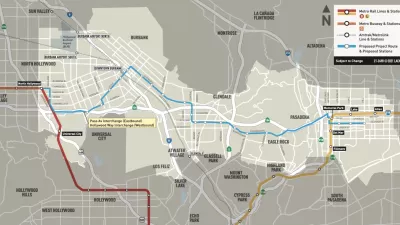In spring of next year, Burbank, CA will debut the nation's first lightweight, zero-emissions bus.
"Designed and fabricated by Colorado-based Proterra, the revolutionary vehicle can travel 250 miles before needing to be recharged, runs at double the fuel economy of a diesel bus and releases nothing but water from the engine exhaust. In addition to being created and built in this country, it relies on power that is 100 percent derived from U.S. sources, thereby reducing dependence on foreign energy."
"The technology is very similar to that used in 2010 next-generation plug-in hybrid vehicles, such as the Chevy Volt. Onboard computers regulate the electrical needs of the engine by alternating between power fed by Proterra's TerraVolt energy storage system, and power derived from the hydrogen fuel cells developed by Hydrogenics Corp. These cells are fed by pressure tanks located on the vehicle's roof, and transform hydrogen and oxygen into water vapor and electricity to charge the batteries. The vehicle may also be recharged by plugging into readily available wall outlets, like many of the new hybrid cars.
'The significance of this milestone program is that we are able to harness the latest transportation technology and put it into service for the public good,' states Johnathan Frank, administrative analyst with the Transportation Department of the city of Burbank. 'Zero-emissions will help the environment, which is a critical issue in Southern California. We're excited to be the first program of its kind in the state.'"
FULL STORY: City of Burbank to Premier World’s First Plug-in Fuel Cell Transit Bus

Maui's Vacation Rental Debate Turns Ugly
Verbal attacks, misinformation campaigns and fistfights plague a high-stakes debate to convert thousands of vacation rentals into long-term housing.

Planetizen Federal Action Tracker
A weekly monitor of how Trump’s orders and actions are impacting planners and planning in America.

San Francisco Suspends Traffic Calming Amidst Record Deaths
Citing “a challenging fiscal landscape,” the city will cease the program on the heels of 42 traffic deaths, including 24 pedestrians.

Defunct Pittsburgh Power Plant to Become Residential Tower
A decommissioned steam heat plant will be redeveloped into almost 100 affordable housing units.

Trump Prompts Restructuring of Transportation Research Board in “Unprecedented Overreach”
The TRB has eliminated more than half of its committees including those focused on climate, equity, and cities.

Amtrak Rolls Out New Orleans to Alabama “Mardi Gras” Train
The new service will operate morning and evening departures between Mobile and New Orleans.
Urban Design for Planners 1: Software Tools
This six-course series explores essential urban design concepts using open source software and equips planners with the tools they need to participate fully in the urban design process.
Planning for Universal Design
Learn the tools for implementing Universal Design in planning regulations.
Heyer Gruel & Associates PA
JM Goldson LLC
Custer County Colorado
City of Camden Redevelopment Agency
City of Astoria
Transportation Research & Education Center (TREC) at Portland State University
Jefferson Parish Government
Camden Redevelopment Agency
City of Claremont




























